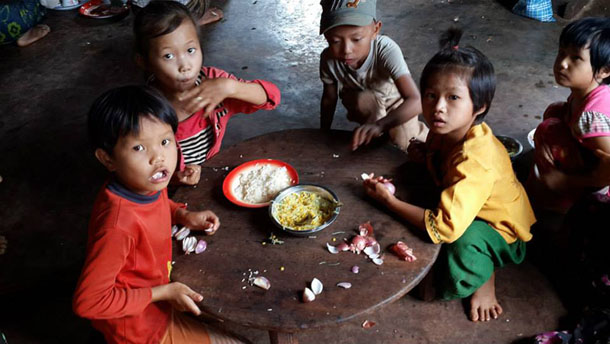More than 200 ethnic Shan people from Kyaythee Township in northern Shan State are sheltering at a monastery after they fled an outbreak of fighting between government troops and ethnic rebels in late June.
Three weeks after the fighting erupted, tension remains high in the area around Pha Saung village, with government soldiers still present at the village, according to local residents and aid workers.
“They left their homes about 10 days after fighting resumed between the SSA-N [Shan State Army-North] and government troops near Tar Pha Saung bridge on June 26,” said Sai Zin, an editor with Shan-language community newspaper Hsenpai News Journal, who went to provide support for the displaced people on Sunday.
“They told us that they had no place to hide when the government troops attacked the SSA-N troops with artillery. They used to hide in their own bomb shelters, but as now it’s the rainy season, so they could not hide in these bomb shelters underground.”
Sai Shwe Thein, the local chairman of the Shan National League for Democracy in Kyaythee Township, said the Pha Saung residents were now sheltering at a nearby monastery in Wan Wat village.
The displaced are also worried that more people will have to flee due to the possibility of further fighting as government troops remain deployed in contested territory, Sai Shwe Thain said.
Local people said the Tar Pha Saung bridge was under the control of the SSA-N and its political wing, the Shan State Progressive Party, until 2011, when the area saw an offensive by the Burma Army. The rebel group signed a ceasefire agreement with the government in 2012, but the two sides now once again vie to control the bridge.
Sai Shwe Thein said there were 209 displaced people, mostly women, young children and elders currently staying at the monastery.
“Before the refugees arrived at the Wan Wat monastery in July 5, some were hiding in the jungle after they fled from their homes,” he said.
Local residents say they want the fighting to end soon so they can return to their farmland to grow rice paddy this rainy season.
For now, they are supported by civil society groups and donations.
“Providing food and shelter support for them is very difficult, we can only help them temporarily,” said Sai Kyaw Khaing, a Kyaythee Township resident who is helping the displaced people.
Additional reporting by Nang Seng Nom.
















